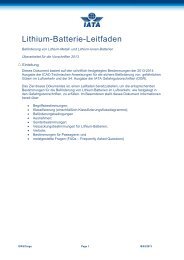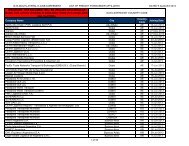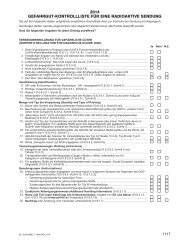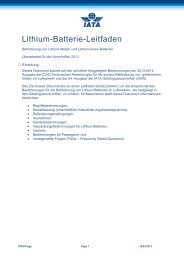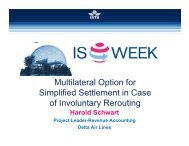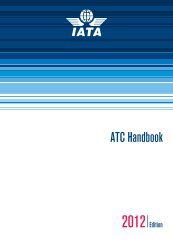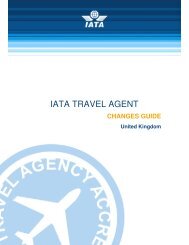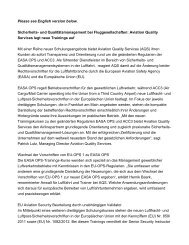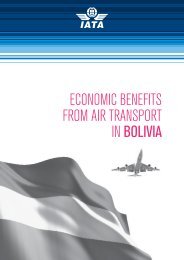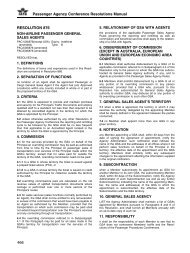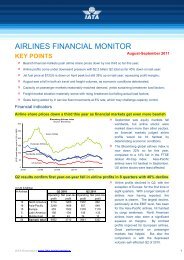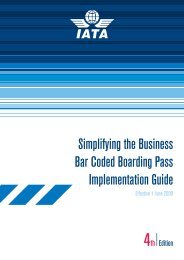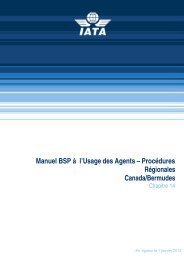Economic Regulation - IATA
Economic Regulation - IATA
Economic Regulation - IATA
You also want an ePaper? Increase the reach of your titles
YUMPU automatically turns print PDFs into web optimized ePapers that Google loves.
06 - <strong>Economic</strong> <strong>Regulation</strong> 49<br />
OTHER REGIONS<br />
Latin America<br />
Many Latin American airports have been privatised<br />
without proper independent economic regulation. In<br />
most cases the governments actually benefit from the<br />
privatisation by extremely high concession fees required<br />
from the concessionaire.<br />
One exception is Mexico where most privatised airports<br />
have a Federal economic regulation that only allows their<br />
charges to rise with inflation minus an efficiency factor<br />
(similar to the UK system). The major flaw in that system<br />
however is there is no requirement for airports to consult<br />
their customers on the level of investment. Airports<br />
are allowed to recover their investment costs with high<br />
rates of return through the regulated charges eventually<br />
leading to excessive pricing.<br />
Asia<br />
Most airports and ANSPs in Asia are still publicly owned<br />
and tightly controlled. However, some of the key gateway<br />
airports (such as Hong Kong and Singapore) have<br />
established, or are in the process of establishing, a form<br />
of economic regulation.<br />
The Indian government also plans to establish an Airport<br />
<strong>Economic</strong> Regulatory Authority in 2007, in response to<br />
the increased privatisation of airports. Its role will be to<br />
regulate user charges and to establish uniform quality<br />
standards across airports.<br />
No regulation<br />
In addition, there are several cases across the regions<br />
where the lack of independent economic regulation<br />
has led to excessive and unjustified user charges. For<br />
example, in advance of its privatisation, the French<br />
government allowed Aeroports de Paris to increase its<br />
charges by 5% in real terms for five years without any<br />
justification or transparency for the decision.<br />
In Argentina, a failed concession leaves airlines with<br />
unacceptable charges levels and full freedom for<br />
the airport to raise more revenue through additional<br />
charges. Instead of independent economic regulation the<br />
government became a business partner with the airport<br />
at the expense of airlines and passengers.<br />
In Germany, the government’s proposals for privatising<br />
its ANSP, DFS, include plans to increase charges by 11-<br />
12% and allow a return on capital of 9.4%, far too high<br />
for a low-risk, monopoly provider.<br />
Examples like these highlight the need for an independent<br />
regulatory structure that takes into account the interests<br />
of customers, protecting them against artificial and<br />
unjustified increases in charges, including where these<br />
are used to boost the value of an airport or ANSP prior<br />
to privatisation.<br />
Even in some of the examples above where a form of<br />
regulation is in place, if the regulator is not independent<br />
from national or local governments it can lead to arbitrary<br />
decisions with little transparency or consultation.



